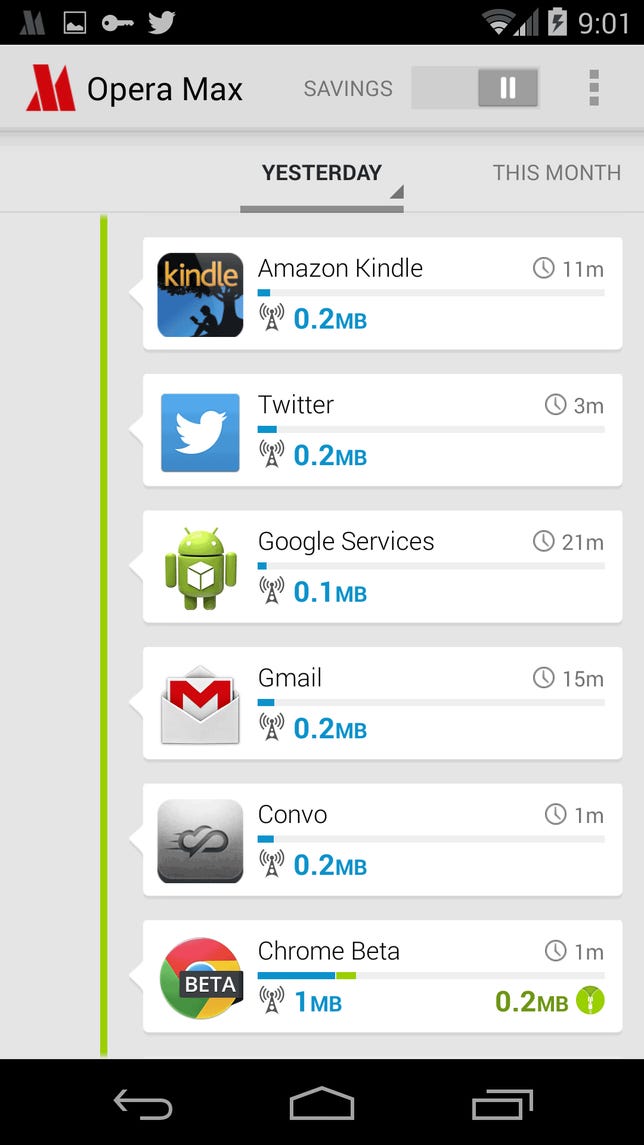BARCELONA — Opera Software on Sunday launched a beta version of Max, its Android app designed to cut data usage by compressing video, photos, and text.
The Norwegian browser company launched a closed beta of the app in December in the United States. Now the open beta will be open to anyone in the US and in Western Europe, with availability elsewhere in the world arriving gradually. Opera opened pre-registrations for Max last week, and accounts are activated on a first-come, first-served basis.
Related stories
- MWC 2022: How to Watch the Samsung Galaxy Book Reveal
- CES 2021: What to expect as the show goes all-digital
- Microsoft warns it might miss revenue guidance because of coronavirus
- Spending time with Huawei’s new Mate XS
- LG unveils new K series phones
The technology is based in part on Opera’s years-long investment in servers that can compress data for delivery to Opera Mini and its other Web browsers’ Turbo mode. But it’s broader than just browsers, since it works with all apps. Users can see how much data each app consumes over a period of time, and how much Max compression saved them.
Max also uses a newer technology — the Skyfire video compression technology Opera got through its 2013 acquisition of Skyfire Labs. As such, it reflects how the company has reshaped itself through acquisitions in recent years — AdMarvel and Handster being other notable buys that have wrought major changes to Opera’s strategy.


screenshot by Stephen Shankland/CNET
Opera Max sets up a virtual private network connection to Opera’s servers for delivery of compressed data over mobile networks. Only unencrypted data is compressed, and the service automatically switches off when a person is using Wi-Fi.
Over a few days’ testing, I found the app generally easy to use — but at least for my purposes, the fact that it only works with unencrypted data limits its utility. Gmail, Google Maps, Twitter, My Tracks, and many other apps didn’t show any savings, at least so far. However, Opera Max did squeeze some data out of browser usage. The app is chiefly designed to take on video, though — Vine and Vevo, for example.
Another issue with the app is that it clutters Android’s notification bar areas — two icons in the bar that expand into two entries in the drop-down list. One comes from Android, which tells you when you’re using a VPN. Update: the other element, from Opera, can be hidden through settings.
The app also lets you block apps from using mobile networks, restricting them to Wi-Fi if you want.
The news came just ahead of Mobile World Congress, a major show here centered on mobile phones and mobile networks. A recurring theme at that show is the strained capacity of mobile networks and data-usage fees, and Opera hopes to profit by alleviating those pains.
Ad-supported or $1 per month
During the beta period, Opera Max is free to use, but it’ll move to a freemium model after that: free for those who watch one ad per day, or $1 a month for those who don’t want ads, Opera said. The monthly fee could pay for itself, Opera suggested, in lower data charges.


screenshot by Stephen Shankland/CNET
Exceeding a data-plan limit may be a rarity for many people, but it’s a big problem when traveling outside their home countries, where data roaming charges can be exorbitant. Opera Max product leader Sergey Lossev, though, was one of those people who ran into difficulties even at home.
He was inspired to create the software because he’d max out his data plan 10 days into the moth while commuting to San Francisco, he said.
Opera Max is available on the Google Play store, but people who run it will likely see a wait before it’s actually enabled for them. “We want to make sure our servers have enough capacity for all of you, so access to our beta will be given out on a first-come first-served basis,” Langeland said.
Opera broadens its business
Opera is best known as a browser company, starting with its personal-computer product, expanding to Opera Mini for lower-end mobile phones, and now with an Opera Mobile push for Android devices. But it’s been expanding its business, most notably with its Mediaworks ad network that’s used to deliver mobile ads on behalf of clients including BMW, Canon, Samsung, Google, Netflix, Lexus, Universal, 20th Century Fox, and Sony.


screenshot by Stephen Shankland/CNET
Mediaworks got its start through the company’s acquisition of AdMarvel and has grown since then. Advertisers paid more than $500 million to publishers in 2013 to place ads through Mediaworks across more than 14,000 mobile sites and mobile apps, with 65 billion ads shown a month.
That transition, along with the shift of its browser technology to the Blink browser engine Google maintains as the heart of its competing Chrome products, hasn’t left everyone pleased with Opera. Jon von Tetzchner, Opera’s co-founder and former chief executive, thinks Opera should have stuck to its browser knitting. And to pick up people being left behind by another canceled Opera product, he’s launched a startup called Vivaldi, a Web site where people can blog, share photos, and chat on forums.
But for a business, money talks. Mediaworks revenue grew 119 percent from the fourth quarter of 2012 to the fourth quarter of 2013, from $19.6 million to $43.1 million. And another new business that stemmed from an acquisition — in this case of Handster — led to the Opera Mobile Store, which had 105 million users at the end of 2013. That’s 172 percent growth.



